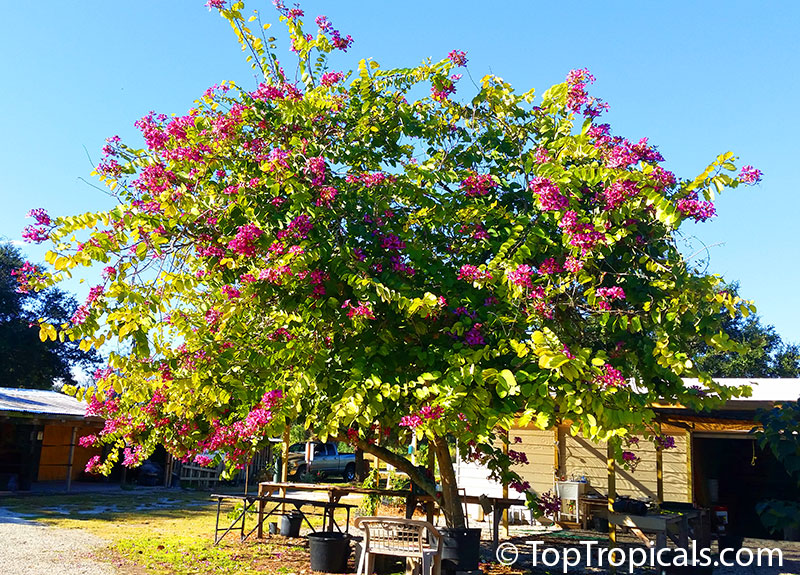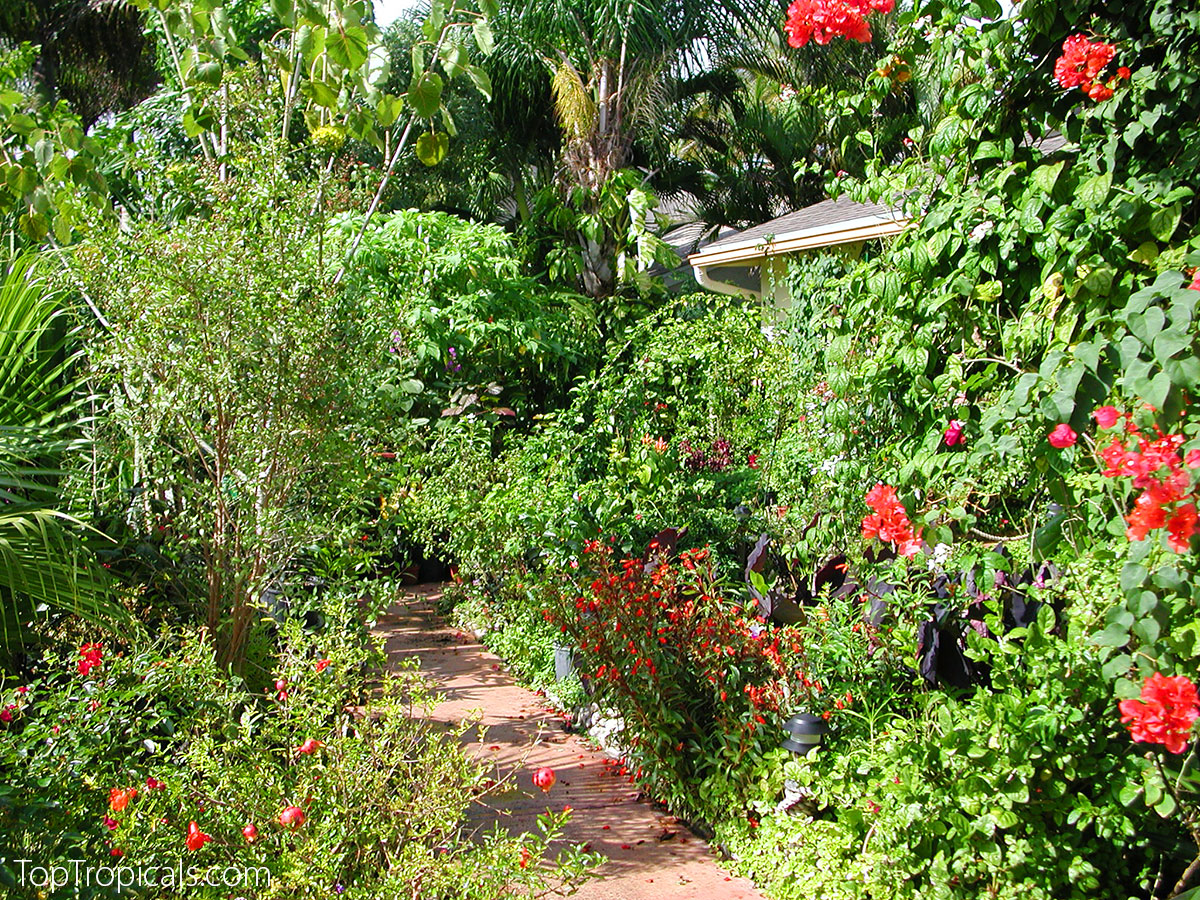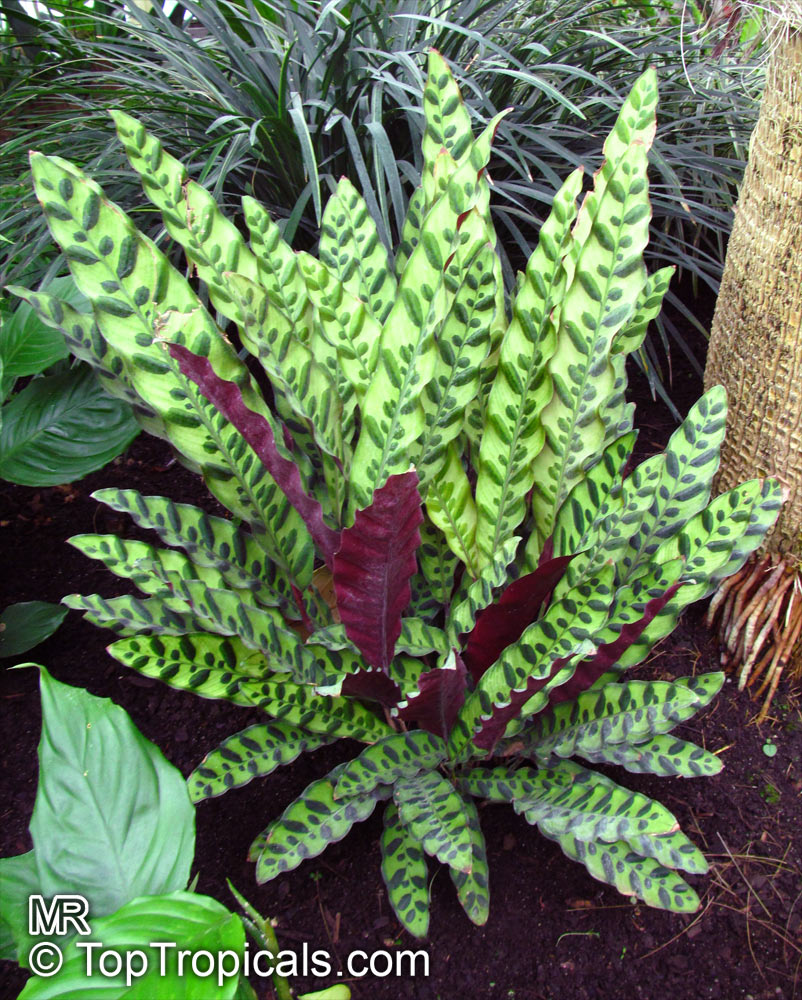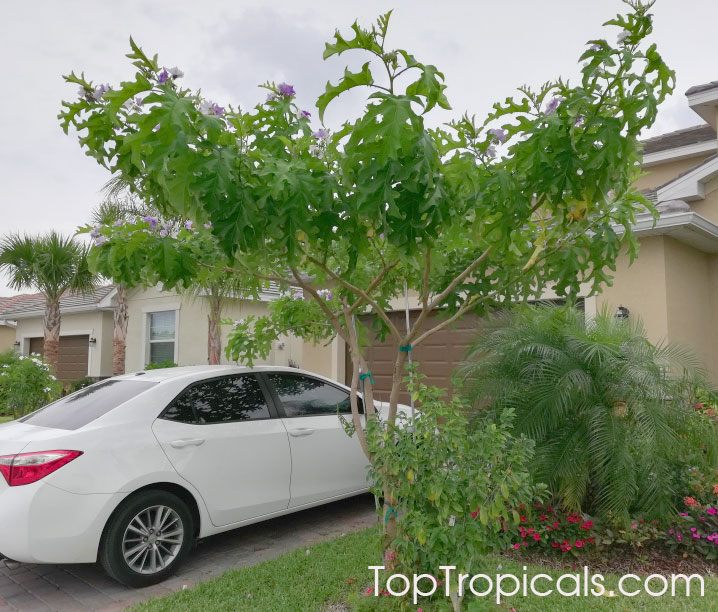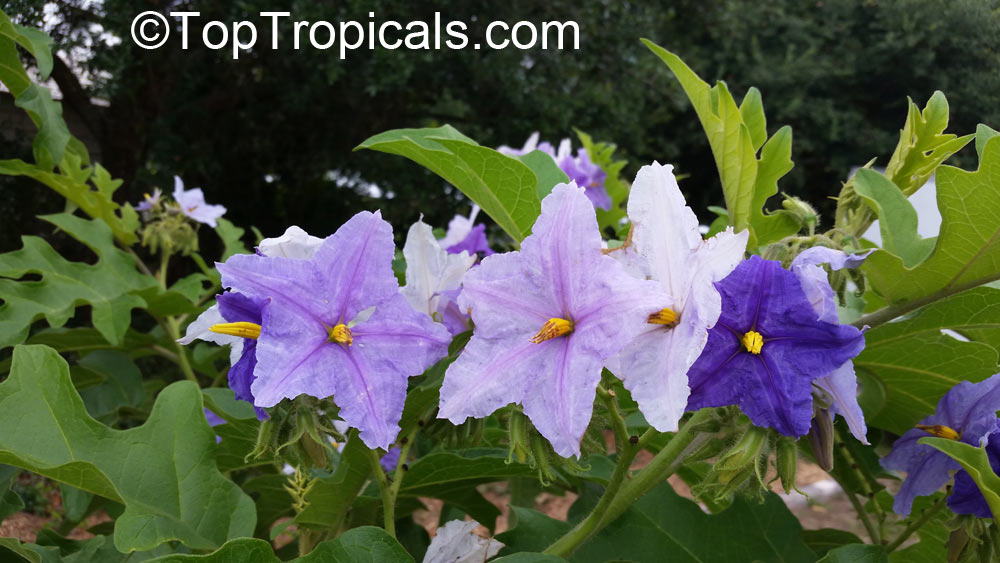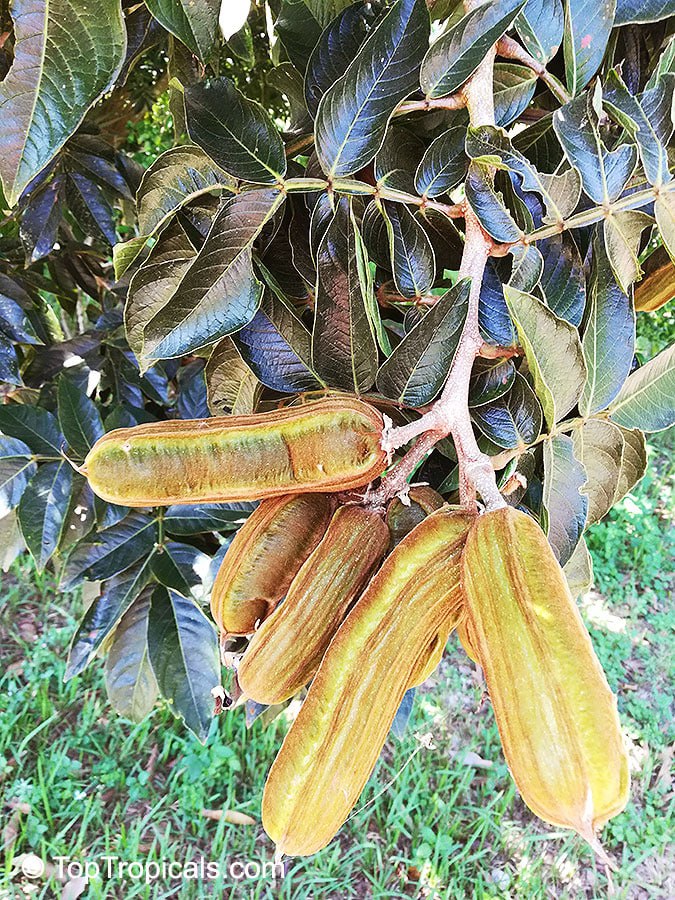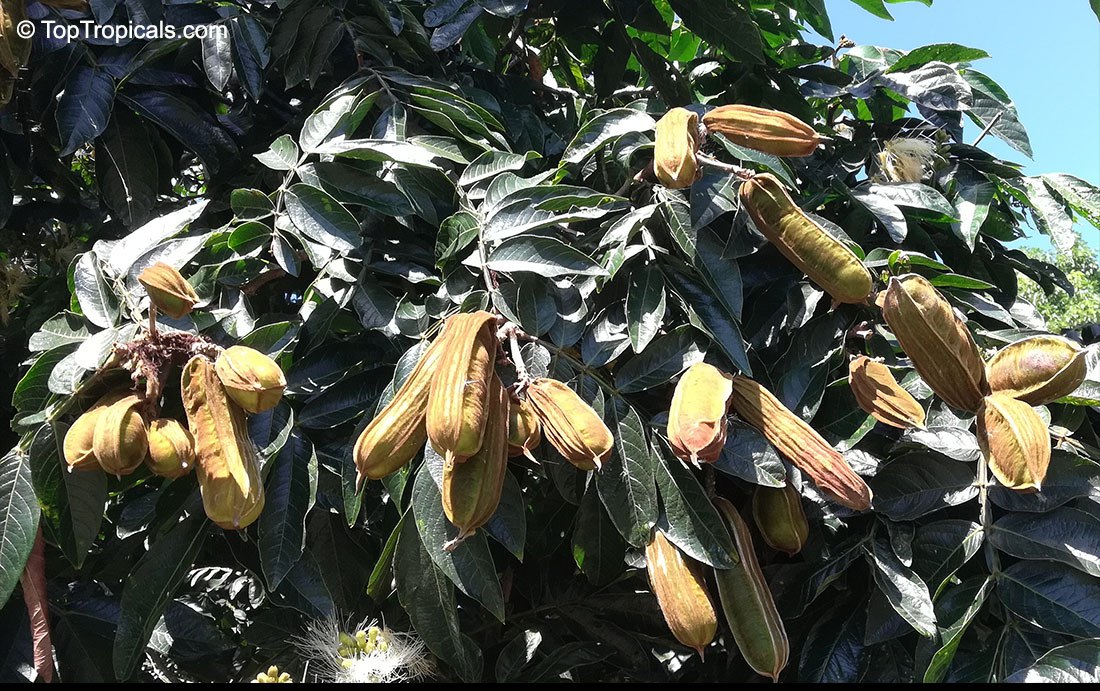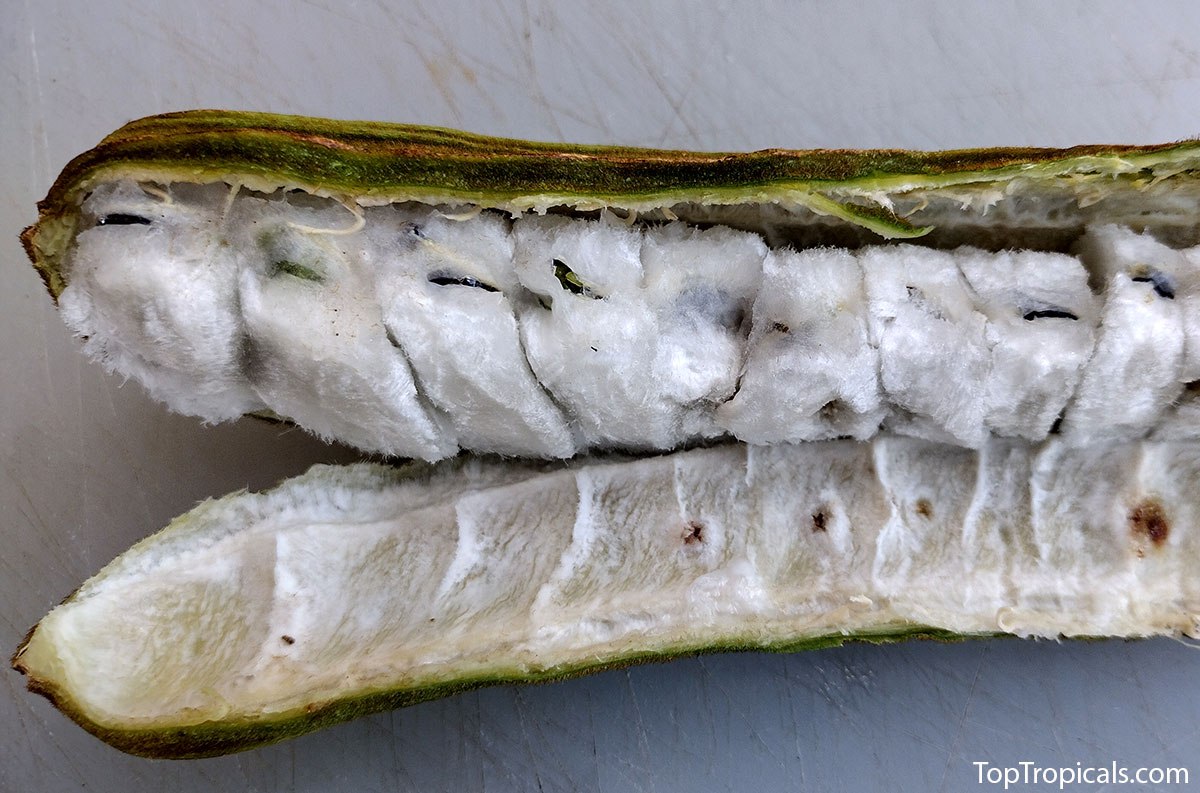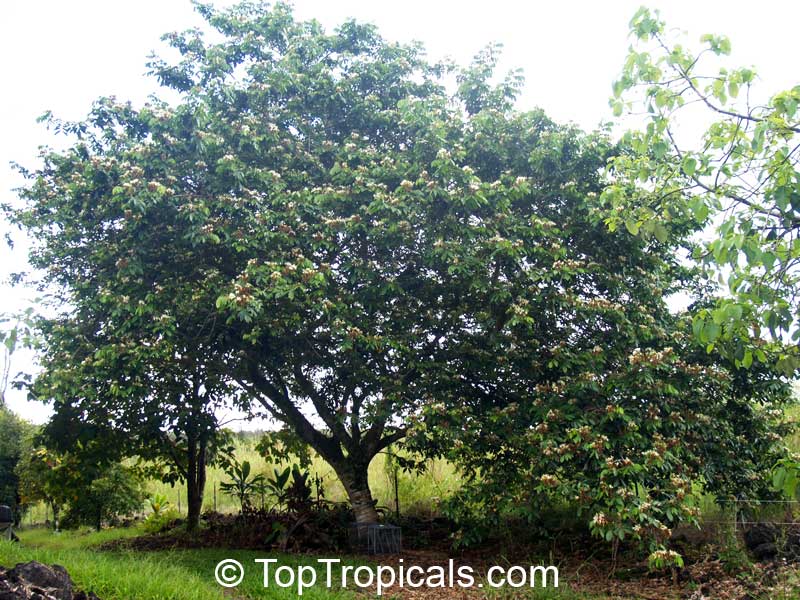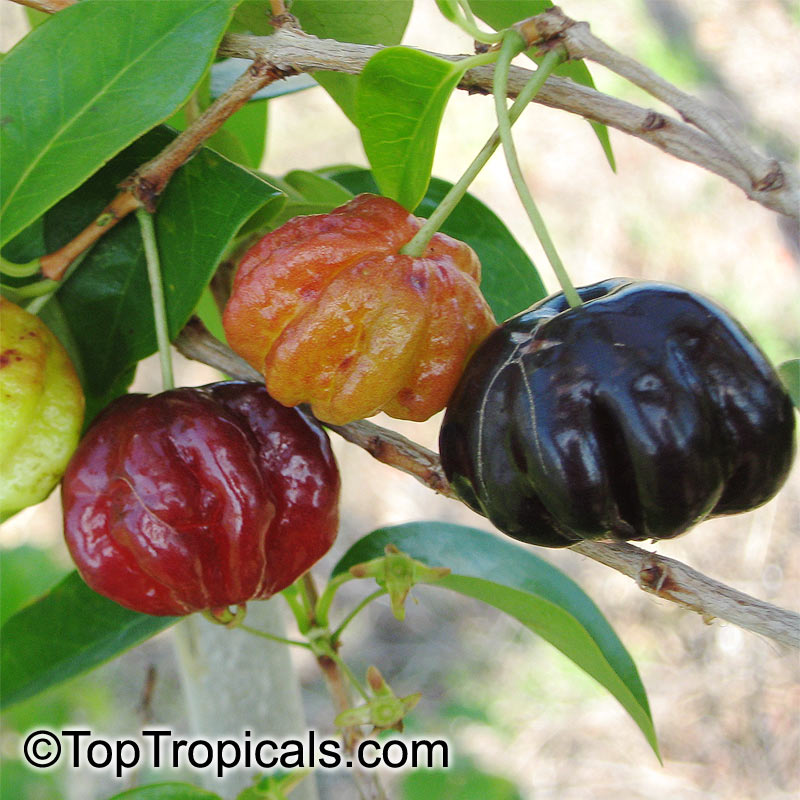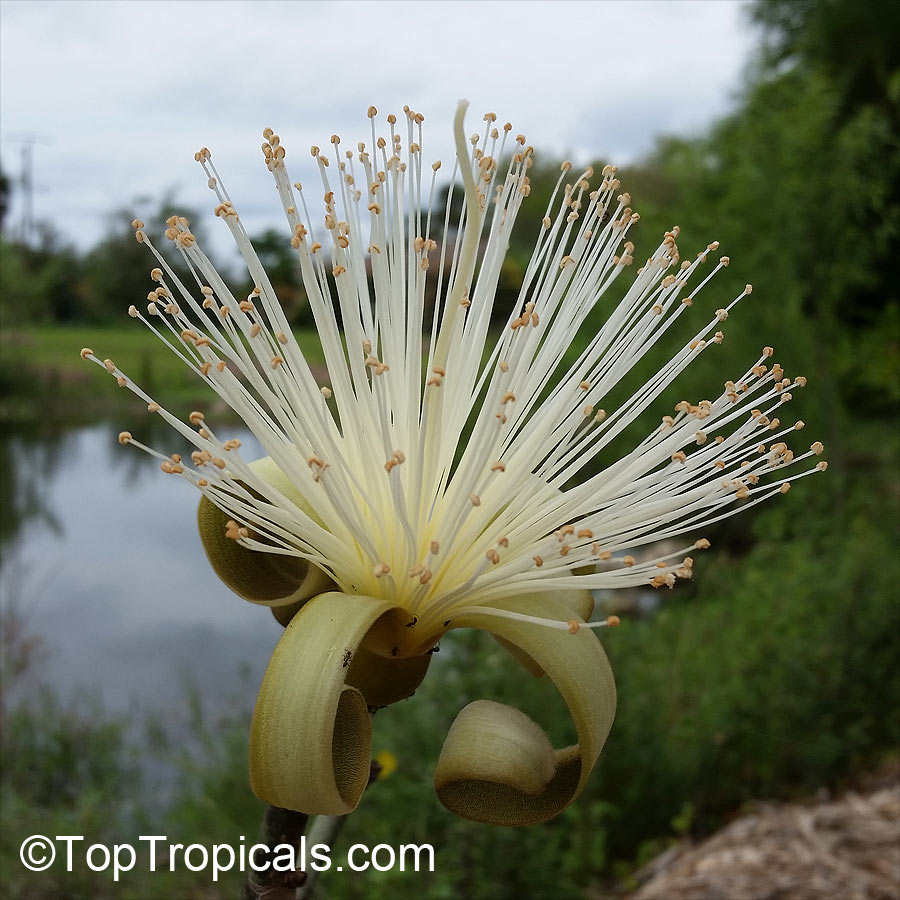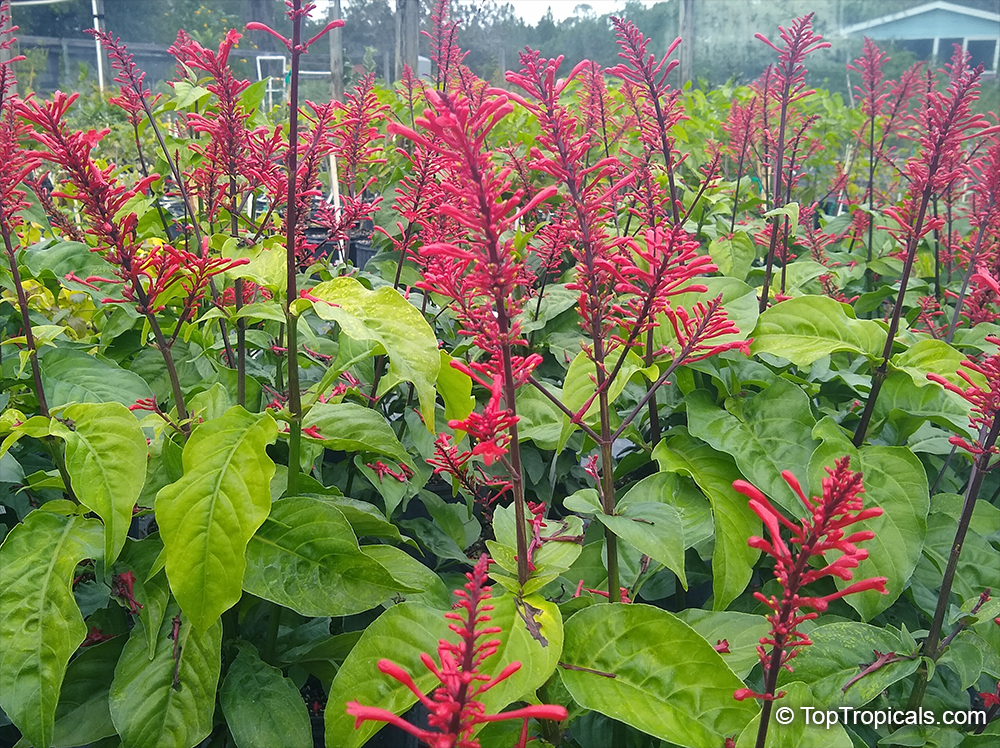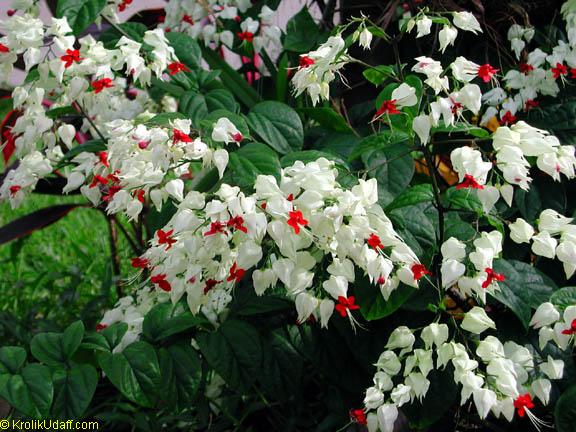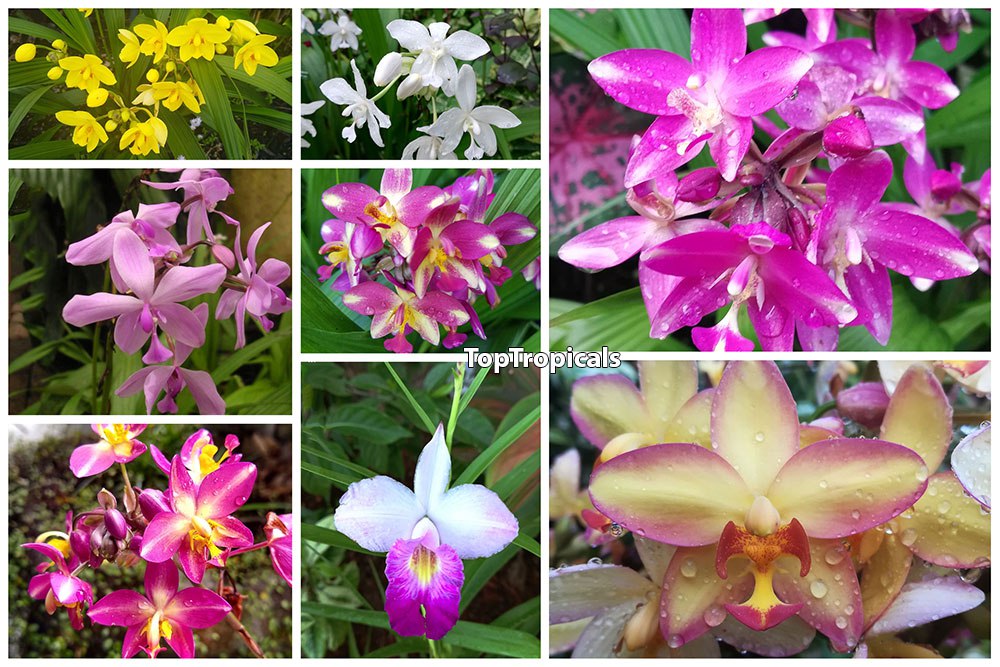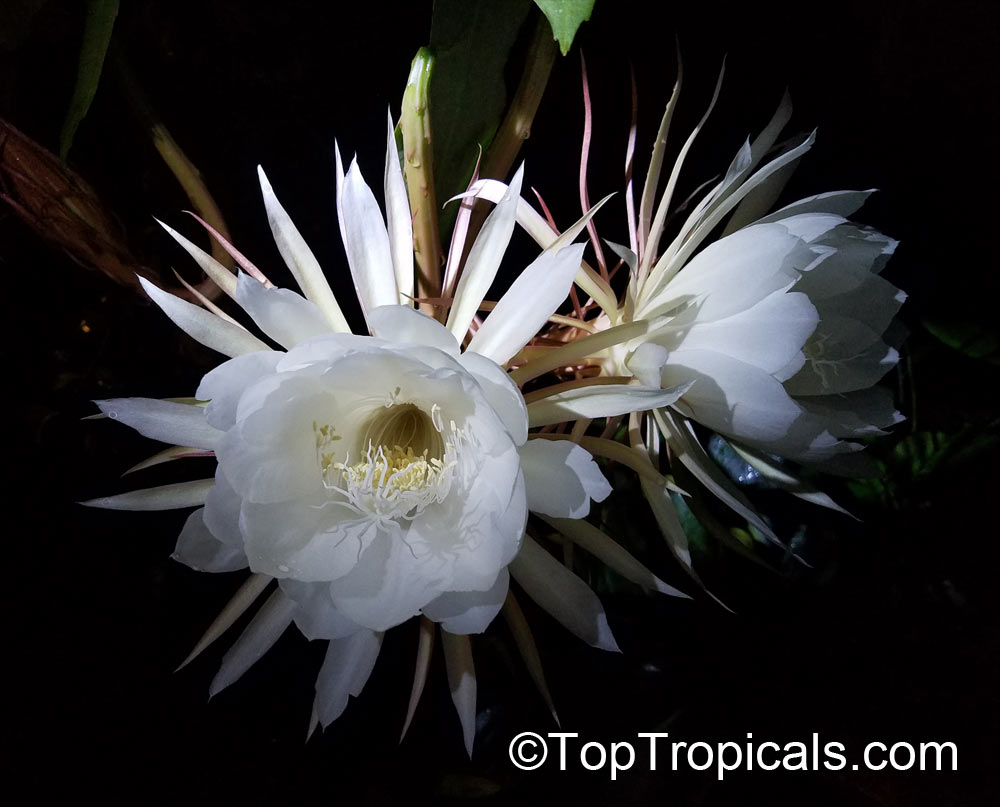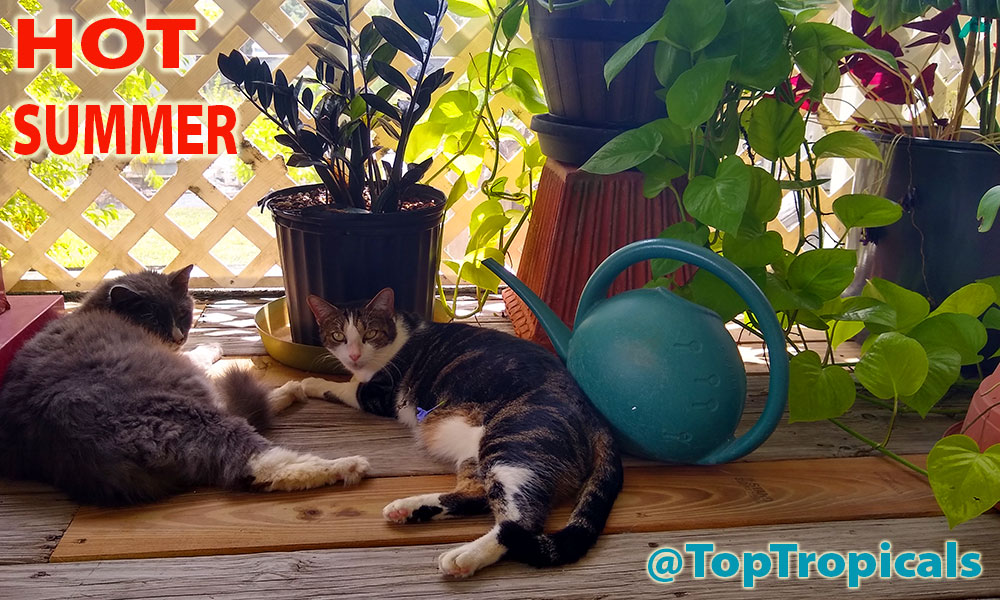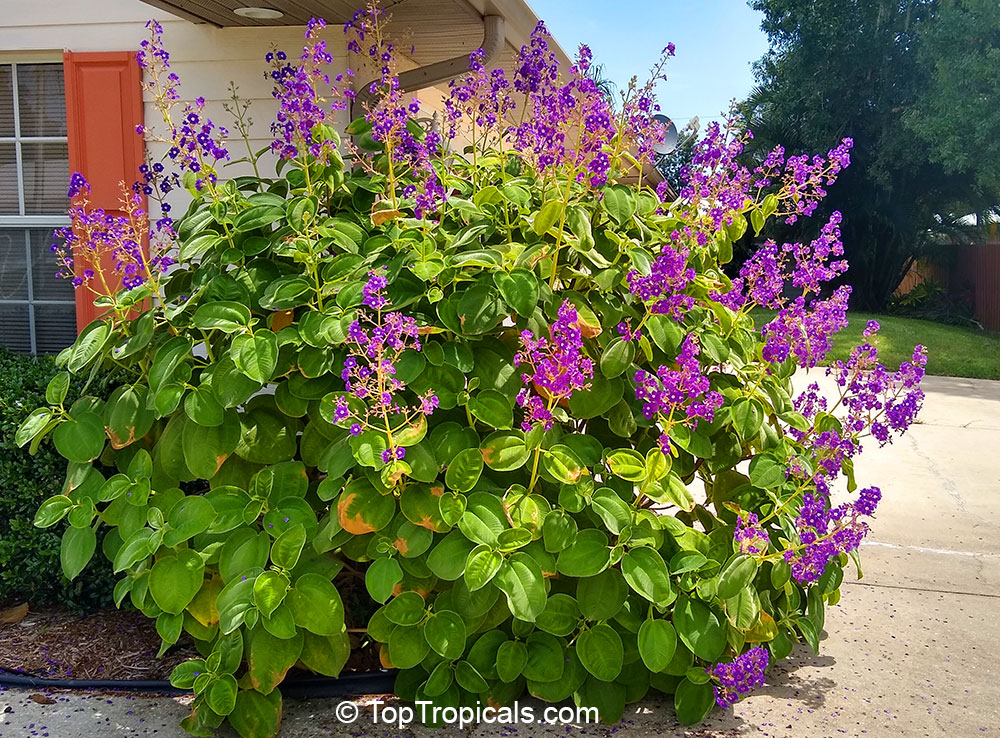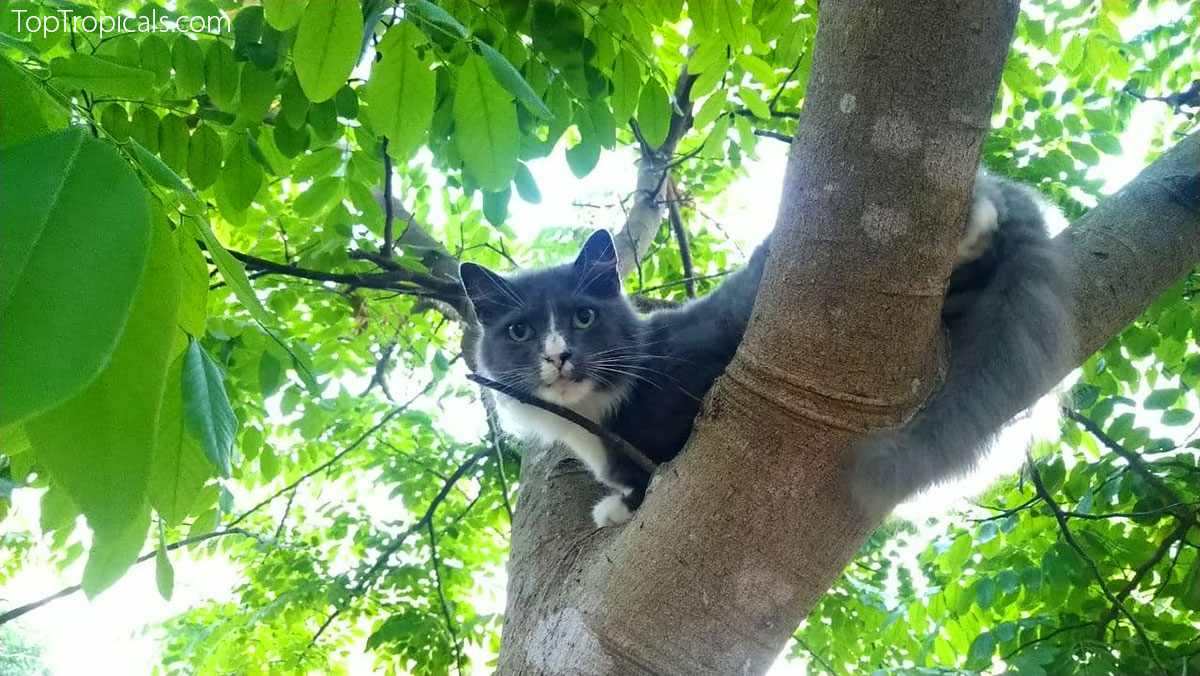Garden Blog - Top Tropicals
Date:
How to get shade quickly... and stay away from oaks
Q: I just moved from Tennessee into a new house in Florida and there are no trees on the property, the yard is brutal hot. What can I plant so I have some shade real quick? I like Florida shady oaks, how long will they take to grow?
A: First
of all, do not rush into oak solution. Oaks are beautiful shade trees, however
they have at least 2 problems:
a) Oaks are slow growers and unless you are willing to wait some 20
years... you won't get that desirable shade that quickly.
b) We have hurricanes in Florida... sometimes. A hurricane can damage
any tree, however with oaks it may be the worse case scenario - the branches
of those giant trees are huge, hard and heavy and in unfortunate situation
when you need to remove or trim a broken tree, it may cost you... a few thousand
dollars.
These are solutions that are more economical and practical:
1) Selection. If you have room, get one of these most popular Florida shade trees: Royal Poinciana, Golden Shower, Hong Kong Orchid Tree, Red Kapok, Bottlebrush, and many others. See full list of fast growing shade trees. Or simply get a Mango Tree and have delicious fruit too! Many varieties of Mangos are very large and fast growing.
2) Do it right. Even if you are planting a smaller tree, 1-3 gal
size, it may become a nice shade tree within 2-3 years and start providing
your driveway with desirable shade. The keys for fast growth are -
a) Good soil. Dig as big hole as possible and fill it with good
rich soil containing compost. See planting instructions PDF.
b) Water. Do not rely on sprinklers and rains. Water your tree
daily for the first week, then at least twice a week for another month. After
that, irrigation system will be enough.
c) Fertilizer. Put a few handfuls of fertilizer in a planting hole. Then fertilize once a month during warm
season. Apply micro elements for even better results and faster growth.
3) Ask experts. Contact our office for advice. We will suggest the most suitable shade tree for your yard based on features of your property: location, soil, exposure, etc.
Date:
🏡 To Use Your Garden Or Be Used By It

Smokey and Sunshine November Planting.
Smokey: Winter roots make spring easy. Keep that plant straight.
Sunshine: I am keeping it straight by not touching it at all.
Smokey: That is exactly what I was afraid of.
November is the month when the garden finally stops yelling at you. The heat backs off, the bugs calm down, and the weeds take a breath. This is when we get to take control again. And as gardeners, we know the truth: Either you use your garden, or your garden will use you in spring. Let me walk you through this, gardener to gardener.
"November is when the garden finally listens. Give it a little direction now, shape it, guide it, and prepare it for spring. It will reward you all year." - Tatiana Anderson, Top Tropicals Plant Expert
🌴 When The Garden Uses You
We have all lived this scene:
- March weeds appear, and two days later it looks like a jungle.
- One missed watering turns into five wilted plants and a full week of recovery.
- A skipped feeding shows up as yellow leaves and panic searching online.
- Bugs return fast, and suddenly you are washing leaves every other day.
- Random plant purchases fill your yard with chaos and mismatched care needs.
- When the garden takes control, spring feels like hard work, not joy.
Overgrown Tropical Garden Showing How a Garden Can Use You
📊 When You Use Your Garden
November flips the script. Plants slow down. Soil stays warm. This is the safest month to experiment, move plants, fix mistakes, and redesign.
What you do now pays off huge in March.
- You map out sun zones and shade zones.
- You mulch now so weeds do not explode later.
- You move plants to better positions without heat stress.
- You remove the high-drama plants before they start another season of complaints.
- You pick what you want for next year instead of letting impulse buys rule you.
Spring becomes smooth instead of overwhelming. And honestly? It feels good to walk outside in March and see order instead of chaos.
In the photo: Every garden starts in small steps. Biquinho Pepper (front) in the garden.
What Benefit Do You Get Personally?
- Less watering.
- Fewer bugs.
- Bigger fruit.
- Better flowering.
- Less money wasted.
- Less time fixing problems you could have prevented now.
This is why experienced tropical gardeners adore November.
In the photo: Organized Tropical Garden. Firebush (lemon gold variety) and Cordylines (Ti Leaf) make colorful spots in the garden.
🐭 Start With Something Small Today (5 Minutes)
Pick one:
- Add mulch to the driest spot in your yard.
- Cut one dead branch from any tree.
- Move one pot to a better sun angle.
- Pull three weeds from the worst area.
- Water deeply once this week.
Small steps now save hours later.
⭐ One Short Story
Last year we planted a Star Fruit in November. By March, it was already covered in flowers, and have been harvesting fruit non-stop since then! That is what winter planning does: it gives plants a head start you can actually see.
🐍 Plants That Will Use You If You Let Them
These are great plants, but only if you plan before planting them:
- Banana (thirsty)
- Hibiscus (hungry)
- Brugmansia (sensitive)
- Passion vine (takes over anything it touches)
Place them wrong, and they become full-time jobs.
In the photo: Passion Vine taking over the swing.
🐰 Plants That Work For You
These feel like free upgrades to the yard:
- Moringa - grows almost on autopilot
- Star Fruit - continuous production
- Dragon Fruit - minimal effort for big results
- Cattley Guava - cold hardy, compact and fruitful
- Loquat - fast fruiting and hardy
- Mulberry - very cold hardy with fruit abundance
- Tabebuia - spectacular winter colors
- Brunfelsia - reliable night fragrance in shade
- Adenium - perfect container showstopper
- Jasmine - instant fragrance
- Mexican Flame Vine - fast growing yet controllable vine
- Wiri Wiri and Biquinho Peppers - always available for your kitchen
- Firebush, Hamelia - everblooming and hardy butterfly native
- Cordyline Ti Leaf - instant leaf colors
- Megaskepasma Brazilian plume - lush tropical foliage with red blooms in shade or sun
- Iris - hardy easy low-growing native for any soil
- Champaka, Joy Perfume Tree - legendary perfume tree that blooms almost year round
- Olive tree - maintenance-free source of olives
- Plumeria - instant Hawaiian perfume flowers all summer
- Dombeya - spectacular hydrangea-like blooms all winter
- Insulin Ginger - instant nature remedy
- Eugenia Cherries and Barbados Cherry - immediate fruit, compact trees for small gardens or pots
- Peanut Butter tree - exotic sweet fruit like peanut butter, compact tree
- Blackberry Jam fruit - exotic fruit like blackberry jam, very small tree
- Colocasia - instant tropical look with Elephant ears
- Strawberry tree - sweet cotton-candy fruit year around
- Papaya - fits any yard, delicious fruit and natural digestive remedy
Pick even one of these and your garden starts giving back.
In the photo: Cattley Guava brings not only tasty fruit but also a wonderful character with its amazing multi-color twisted trunk.
🌡️ November Advantage
You cannot ruin anything in November. This is the safest, calmest month to shape your garden the way you want. If you act now, spring becomes a victory lap. If you wait, spring becomes a rescue mission.
In the photo: Adenium is a colorful accent in the garden.
💐 Thanksgiving Tie-In
This is the season to reset, breathe, and be thankful for your outdoor space. A garden that works for you is one of the best gifts you can give yourself going into the new year.
Start your November plan today. Use your garden. Do not let it use you.
In the photo: Megaskepasma, Iris, Colocasia, Crotons, Dracaena and Ti Leaf bring instant tropical look to your garden.
Date:
Full Sun Garden vs Shade Garden
"Someone is sitting in the shade today because someone planted a tree a long time ago." (Warren Buffett)
Q: I live in California and I have a large area of my garden in full shade. Are there any plants that will be happy there? I am looking for something colorful. I also have a smaller area in front of the house that has full sun almost all day long, but I am afraid this can be too hot for flowering plants? Can you recommend something?
A:
Full sun gardens have a strong, bright look while shade
gardens have cooler, subdued appearance. Both types of
gardens are fun to design and maintain as long as you pick
the right plants.
Full Sun Garden is the easiest to grow. Depending
on exposure, it may require some plants that can tolerate
the hottest summer days and the dry conditions in your
area. The good news is, the majority of tropical and
subtropical plants prefer full sun, so you have a large
selection to pick from - fruit trees, flowering trees,
shrubs, vines, and small perennials. The more sun, the
more flowers and fruit you will get! However, keep in mind
that sun gardens require more water, but generous mulching
will help to minimize watering.
Shade Garden is much more restful in appearance,
but sometimes may be a little more difficult to work with.
As shade trees grow bigger and thicker, it may become too
dark; nothing will grow in total darkness. In this case
you need to prune back some branches to let more light in.
Filtered sunlight or dappled light coming through the
leaves of the trees is beneficial and considered light
shade, which would be the best light conditions for shade
loving plants to thrive. Although shady cooler spaces
attract more insects and will require more attention to
control them, they also have some advantages over sun
gardens. You can enjoy working in cooler conditions, and
your garden will require less water. Many foliage plants
look more deeply colored and healthier than in full sun;
white flowers shine instead of looking washed out!
Our favorite shade plants are fragrant brunfelsias , clerodendrums, and of course
colorful gingers and heliconias. You
may also consider ornamental foliage of Calatheas, lush Alocasias, Colocasias, and colorful Cordylines. Check out our shade loving plant list for
more colorful suggestions. These are also great for indoor
gardens!
Date:
Quick shade for your driveway
Q: Please help! We just moved into a new house in Florida and don't have any mature trees yet, but the sun is already brutal! Can you suggest any super-fast growing shade tree that can make shade over my driveway as soon as possible?
A: Check out Giant Potato Tree - it is very fast growing, has very large leaves plus very pretty purple flowers as a bonus year round! The pictured tree was planted from 3 gal only 6 months ago, and already covers with shade the whole car. It is small to a medium size tree, but one of the fastest growing. If you are looking for a larger tree and willing to be more patient, here is the full list of tropical and subtropical fast growing shade trees. Most of them may take a few years until they reach a mature size, however, in order to enjoy your shade tomorrow, you must plant the tree today!
How to get big shade tree in one season with an ice cream on it? Its real!
- 🍦 Ice Cream Bean Inga is the ultimate fast-growing, shade-providing fruit tree with an irresistible twist! It not only transforms your yard into a cool, inviting oasis in record time but also produces fruit that kids (and adults!) can't get enough of!
- 🍦 Picture this: pods up to a foot long, bursting with sweet, creamy pulp that tastes exactly like ice cream!
- 🍦 Craving instant shade? Perfect for those sunny spots where you need shade, the Ice Cream Bean Inga rapidly unfurls its lush, umbrella-like canopy, creating a natural, leafy retreat in just one season!
- 🍦 With its delectable treats and speedy growth, this extraordinary tree is sure to be the highlight of your garden - where shade and sweetness meet!
🛒 Get shade with ice cream benefit
#Food_Forest #Fun_Facts #Nature_Wonders #How_to
🏵 TopTropicals
Date:
Shady spots aren't a problem - they're an opportunity
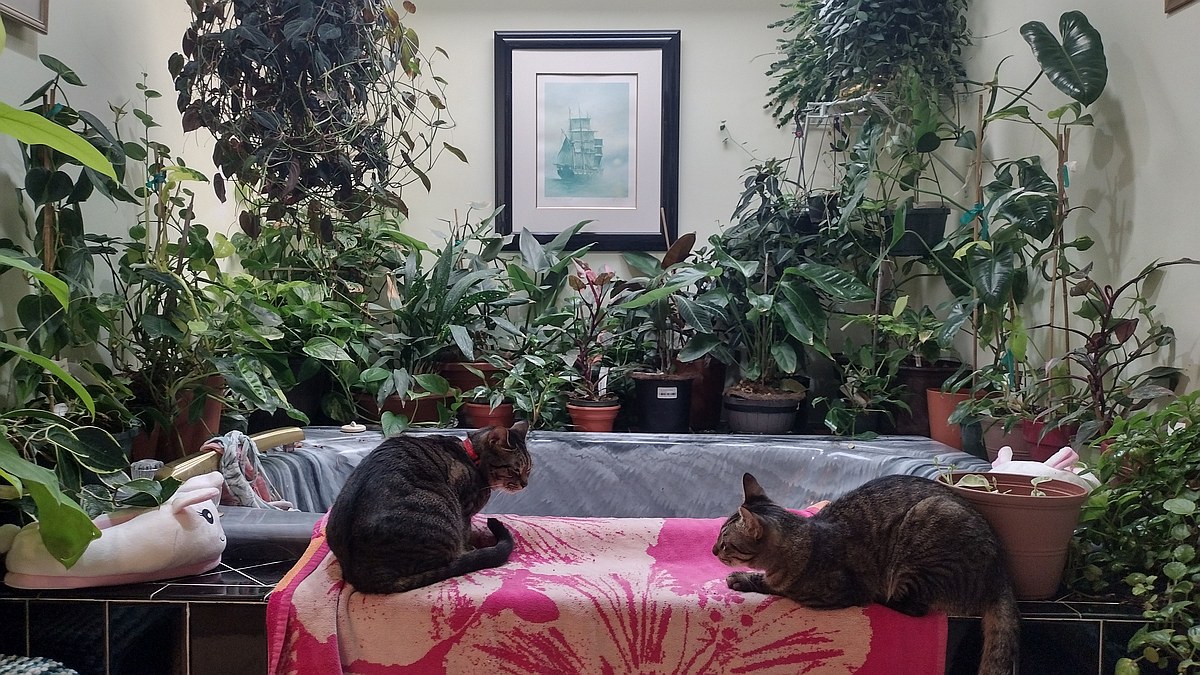
Photo above: Niki and Cash, the Top Tropicals PeopleCats-in-residence, lounging in a lush indoor jungle
Most tropical gardens have at least one corner that gets morning light, filtered sun, or just bright shade - and that's exactly where Anthuriums thrive, along with many other shade-loving plants. That makes them ideal for spaces where other tropicals struggle.
Don't have a greenhouse? You don't need one. Anthuriums do beautifully on a shaded porch, in a screened lanai, or even indoors near a north or east-facing window. They're perfect for:
- Bathrooms with natural light
- Bright kitchens with indirect sun
- Shaded entryways or under eaves
- Hanging baskets under tree cover
- Mounting on cork or wood in humid areas
Even a small space can feel like a tropical conservatory with the right plant - and Anthuriums bring that look without being demanding. They grow slowly, stay manageable, and don't need constant pruning or repotting.
Best of all, they reward consistency. Keep them warm, give them some humidity, water when the top inch feels dry, and they'll stay healthy for years. No drama - just quiet, lasting beauty. If you've never grown tropicals in the shade, this is where to start.
What is a perfect shade tree with flower benefits? Discover the sunny Kassod Tree
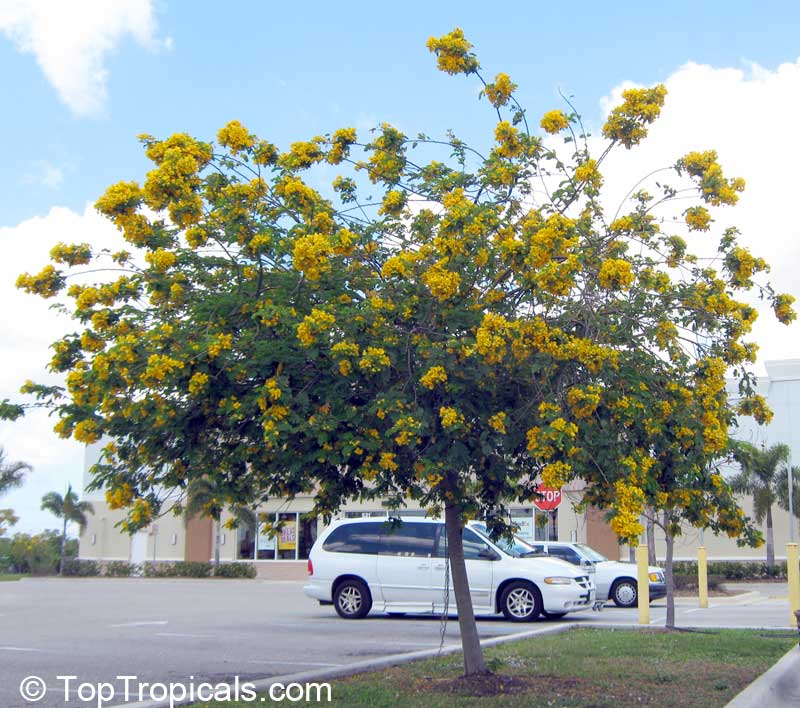
Cassia siamea - Kassod Tree (Siamese Senna)
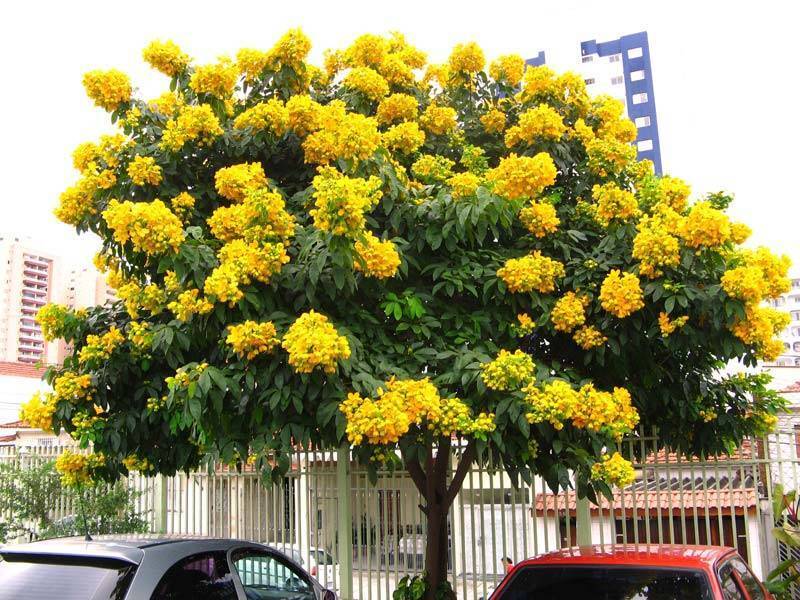
Cassia siamea - Kassod Tree (Siamese Senna)
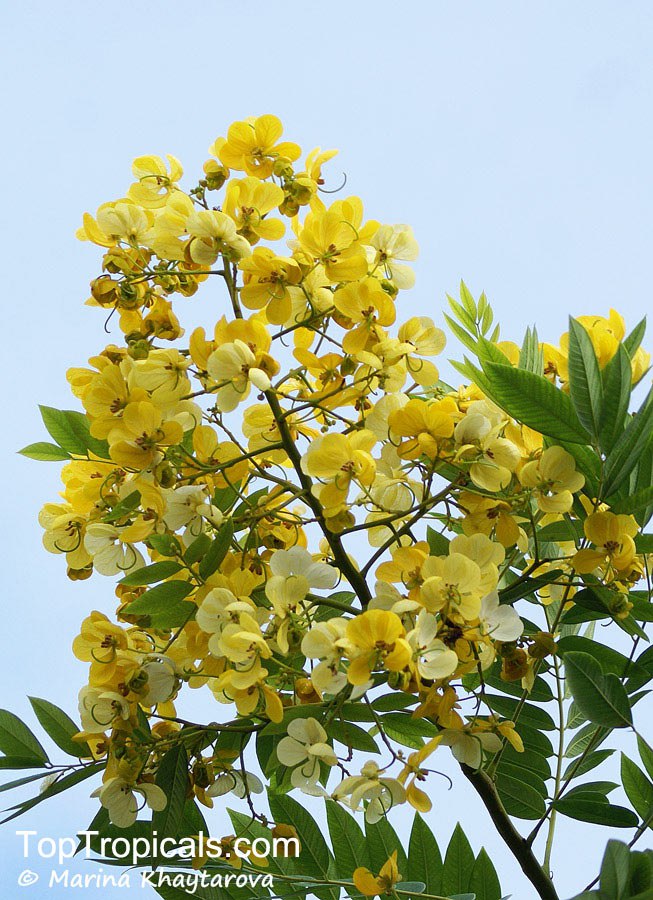
Cassia siamea - Kassod Tree (Siamese Senna)
- 🟡 Cassia siamea - Kassod Tree (Siamese Senna) is a remarkable subtropical tree known for several special features:
- 🟡 Fast Growing, making it an excellent choice for quick shade and ornamental use.
- 🟡 Bright yellow flowers that bloom in clusters, adding a vibrant splash of color.
- 🟡 Evergreen foliage: lush green leaves year-round, providing continuous beauty and shade.
- 🟡 Hardy: highly resilient and can thrive in a variety of soil types and conditions, including poor soils and dry climates. Tolerates both light frost and summer heat.
- 🟡 Low maintenance, easy care, not messy, making it an ideal choice for both novice and experienced gardeners.
- 🟡 Nitrogen fixation: Improves soil fertility by fixing nitrogen, benefiting surrounding plants and enhancing garden productivity.
- 🟡 Medicinal use: herbal medicine (laxative properties and to treat various ailments).
- 🟡 Attracts bees, butterflies, and other pollinators, supporting local biodiversity and ecosystem health 🐞🐝
- 🟡 Shade provider: Ideal for creating shaded areas in gardens and landscapes, contributing to a cooler environment during hot weather.
🛒 Add shade and color to your garden with Kassod Tree
#Butterfly_Plants #Trees
🏵 TopTropicals
Date:
What are the easiest, low maintenance plants?
Photo above: Bauhinia blakeana - Hong Kong Orchid Tree. The most beautiful of all orchid trees. This winter bloomer starts flowering in very small size, when only 2-3 ft tall, and grows fast. (Bonus plant: makes it 7 easy plants!)
Six easiest to grow, effortless plants
Q: I'm seeking low-maintenance, tropical plants for my yard since I have limited time for gardening. Could you recommend some easy-to-care-for options that will still give my outdoor space a tropical feel?
A: Tropical plants don't necessarily require extensive care. Many options are low maintenance, effortless, and easy to grow, including a variety of plants, trees, shrubs, and vines that demand minimal upkeep. They are fast growing, not fussy about soil, cold- and heat- resistant, and can rely on regular sprinkler irrigation. Below are six our favorites - the easiest and most effortless tropical plants for your Southern landscape. You can find the full list here.
1. Fruit tree: Lolita Cherry
Eugenia uniflora - Black Surinam Cherry Lolita. The plant is vigorous and ready to fruit the same year. The fruit has exceptional flavor, very sweet, without aftertaste, large 1-1.2 inch, very juicy. Reliable producer. These cherries are cold hardy and can take short periods of frost.
2. Flowering tree: Shaving Brush Tree
Pseudobombax ellipticum - Shaving Brush Tree is one of the coolest looking flowering trees, this fast-growing tree bears spectacular showy staminate flowers in the spring. It usually has no leaves at that time, which serves to show off the large and striking blooms. Very low water needs, grows fast!
3. Flowering shrub: Firespike
Odontonema cuspidatum - Firespike - ultimate butterfly magnet with showy bright red flowers. Will take sun or shade. Very easy and happy plant!
4. Flowering vine: Bleeding Heart
Clerodendrum thomsoniae - Bleeding Heart. One of the most spectacular blooming vines. Spectacular, dramatic flowers are slightly flat, they have white sepals on either side of bright crimson petals. The appearance may be liken to a line of dangling hearts, each emerging from the other. Very easy to grow and undemanding plant. Blooms in both sun or shade!
5. Small perennial: Ground Orchids - many colors!
Ground orchids are the easiest and most rewarding flowers for a tropical garden. They thrive in regular garden soil or potting mix, tolerate both sun and shade, and bloom nearly year-round. They take both sun or shade, are cold-resistant and carefree. And look at these colors! From vibrant purples to soft pinks and yellows, ground orchids bring a splash of tropical beauty with minimal effort. Their consistent blooming makes them a must-have for gardeners seeking color all year.
6. Fragrant exotic: Queen of the Night
Epiphyllum oxypetalum - Queen of the Night - powerfully fragrant at night! This special cactus grows in tropical rainforests and has large wide meaty leaves. The flower is huge, white, and nocturnal. Blooms at night hours, hence the name. One of the most exotic indoor plants, great shade garden specimen. Easy to care, very low maintenance. Very low water needs.
Date:
10 tips how to care of tropical
garden
during hot Summer
Q: Do you have any special recommendations how to take care of plants during hot season, to reduce heat strees?
A: Tropical plants prefer temperatures of 70-90F, except for heat-adapted desert plants. High temperatures above 90F can cause slowed metabolism and signs of stress like wilting, yellowing, and leaf drop. Hot and humid conditions attract pests and fungal diseases. To keep your plants stress-free and healthy, during Summer:
1. Monitor temperature and signs of stress.
2. Provide shade to regulate heat exposure: use shade cloth or simply a sheet of fabric as needed to protect lush foliage from burns.
3. Choose heat-tolerant plant varieties.
4. Plant in groups and levels, with trees protecting smaller shade loving plants (see companion planting).
5. Water deeply in the morning or evening to prevent evaporation.
6. Mulch to conserve moisture and regulate soil temperature.
7. Air: ensure good air circulation.
8. Trim damaged foliage and crowded branches.
9. Fertilize: use appropriate fertilization to improve plant heat tolerance. Remember, plants need lots of food during active growth period.
10. Remove weeds, pests, and diseases promptly.
In the photo: Tibouchina multiflora (grandifolia) - Glory bush, Quaresmeira, one of the most impressive flowering plants for tropical gardens, with impressive, large velvet leaves and beautiful purple flowers. It blooms in both sun or shade!
Date:
🌞 How to help your plants survive a hot summer
Q: It's getting so hot that my plants stay droopy all day, how much water is enough water? Any advice how to help them to survive this heat?
A: Yes, it's official - summer has cranked up the heat, and your garden knows it. Blame it on the dreaded heat dome - a big ol' pressure lid in the sky that traps hot air like a pressure cooker. Basically, it's summer's version of putting your plants in an oven - without the cookies... But don't panic! With a little extra care (and water), you can help your leafy friends make it through the sizzle without going crispy. Here's how to beat the heat in your garden:
Eight rules during summer heat
1. Water early, and generously. Morning is the magic hour. Before the sun gets too intense, give your plants a slow, deep drink - like a spa treatment before a big day. Watering in the middle of the day? Bad idea. It's like pouring water on a hot frying pan - evaporates fast, and can even scorch leaves.
2. Mulch like you mean it. A nice 2-3 inch blanket of mulch keeps your plants' roots cool and the moisture locked in. Think of it as sunscreen and air conditioning for the soil. Pine straw, bark chips, shredded leaves - whatever you've got, pile it on.
3. Give them some shade. If your plants are looking like they're sunbathing without sunscreen, help them out. Use old sheets, umbrellas, shade cloth - whatever works. Even a light shade can make a big difference. New plants, veggies, and shade lovers like philodendrons will thank you.
4. Put down the pruners. Right now, your plants are in survival mode. Pruning in extreme heat can stress them out more. Let them ride out the heat wave before giving them a trim.
5. Don't move in this heat. If you're thinking of transplanting that poor little tree - hold that shovel. Moving plants during extreme heat is like moving house during a heatwave - everyone ends up grumpy. Wait until cooler weather rolls back in.
6. Pamper your potted plants. Pots heat up fast and dry out even faster. Move your container plants to shadier spots and check their soil often - don't let it go bone dry. They can't dig deeper for water, so you're their lifeline.
7. Know the signs of heat stress:
- Droopy in the day, perky at night? Normal. They're just hot, not dying.
Keep watching.
- Crispy edges or curling leaves? They're too dry. Deep water, mulch,
shade.
- Still wilted the next morning? That's a red flag. Time to step up the TLC
- soak thoroughly and shield from the sun.
8. Don't forget about yourself! If your plants are feeling the heat, you probably are too. So wear a hat, slap on sunscreen, hydrate, and do your gardening early or late in the day.
Need help planning your garden's heatwave strategy? We're here for you, 7 days a week. Reach out to the Top Tropicals team and we'll get your plants through summer with style!
Stay cool and grow on,
Kristi V. - your Tropical Plant Expert 🌴
